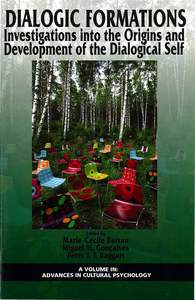Personal chronotopes in the dialogical self: a developmental case study
Raggatt, Peter T.F. (2013) Personal chronotopes in the dialogical self: a developmental case study. In: Bertau, Marie-Cécile, Gonçalves, Miguel M., and Raggatt, Peter T.F., (eds.) Dialogic Formations: investigations into the origins of the dialogical self. Advances in Cultural Psychology: constructing human development . Information Age Publishing, Charlotte, NC, USA, pp. 235-250.
![[img]](https://researchonline.jcu.edu.au/15154/1.hassmallThumbnailVersion/15154_Raggatt_2012_cover_image.jpg)
|
Image (JPEG) (Book Cover)
- Cover Image
Download (401kB) |
|
|
PDF (Author Accepted Version)
- Accepted Version
Download (256kB) |
||
|
PDF (Published Version)
- Published Version
Restricted to Repository staff only |
Abstract
This collection on developmental themes contributes to a spate of recent books on the dialogical self (e.g., Aveling et al., 2010; Hermans and Gieser, 2012; Hermans and Hermans-Konopka, 2010). Their emergence confirms the growing importance of 'dialogism' for psychology and the social sciences (Holquist, 2002). In psychological traditions, 'dialogical self theory' (DST) has multiple roots: first, i nthe pragmatism of William James' (1890) notion of an extended (social) self; second, in the social psychology of George Herbert Mead's (1934") focus on 'otherness' as a source of self-reflection; and third (and above all), in an engagement with the concepts of 'dialogiue,' 'polyphony,' 'multio-voicedness' and 'mediation' emerging in the Russian work of Bakhtin (1981, 1984, 1990) and Vygotsky (1978). Bakhtin's dialogical epistemology, in particular, has made possible new linkages from literary and social theory to psychological studies of a more pluralist and relational self than the 'self-contained' one proposed by Enlightenment and individualism (Sampson, 1985). The growing literature spawned by these linkages suggest that the dialogical approach is an important new innovation. At the cultural level, postmodern shifts in the possibilities for the self brought about by global electronic communication and by mass migrations, converge with these recent innovations. In short, more challenging theoretical frameworks are demanded for the study of the self; frameworks which reach beyond traditional Western conceptions of integration, self-containment and sovereign agency (Gergen, 1991; Gregg, 1991).
| Item ID: | 15154 |
|---|---|
| Item Type: | Book Chapter (Research - B1) |
| ISBN: | 978-1-62396-037-7 |
| Date Deposited: | 11 Dec 2012 01:34 |
| FoR Codes: | 17 PSYCHOLOGY AND COGNITIVE SCIENCES > 1701 Psychology > 170102 Developmental Psychology and Ageing @ 50% 17 PSYCHOLOGY AND COGNITIVE SCIENCES > 1701 Psychology > 170106 Health, Clinical and Counselling Psychology @ 25% 17 PSYCHOLOGY AND COGNITIVE SCIENCES > 1701 Psychology > 170109 Personality, Abilities and Assessment @ 25% |
| SEO Codes: | 92 HEALTH > 9299 Other Health > 929999 Health not elsewhere classified @ 50% 97 EXPANDING KNOWLEDGE > 970117 Expanding Knowledge in Psychology and Cognitive Sciences @ 50% |
| Downloads: |
Total: 3623 Last 12 Months: 13 |
| More Statistics |



